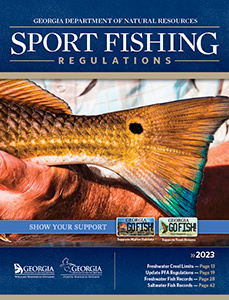Handling & Releasing Fish
Many marine fish have gas-filled organs called swim bladders. These organs control buoyancy and allow the fish to maintain depth. When some fish are brought quickly to the surface, the gas in the swim bladder can over-expand and rupture the bladder, a condition known as ”barotrauma.” Escaping gas fills the gut cavity which can lead to everted stomachs or intestines. If released in this condition, the fish cannot descend and may float away and die. Generally, fish caught deeper than 30 feet will suffer some effects of barotrauma.
- Recompression. The best and first choice for release should be to return fish to the depth from which they are caught, a technique known as recompression. A variety of recompression tools are on the market, including descender devices, release weights, and release baskets (see
TakeMeFishing.org/FishSmart ). Fish should be returned to the depth of capture when practical. If catching fish at great depth, returning them to at least 60 to 100 feet will dramatically improve survival. - Venting. If recompression is not possible, venting is a second option. Venting helps the gas escape and allows the fish to descend. A simple venting tool can be made by mounting a sharpened football needle in a 1" x 3" dowel rod with a hole drilled lengthwise through the rod to allow gas to pass. Hold the fish gently on its side. Insert a needle through the thin lower body wall below the rear end of the pectoral fin. Insert the needle only as far as needed to allow the gas to escape. Squeeze gently to help push the gas out.
- Do not puncture a protruding stomach or try to push the stomach back into the throat. Remember a knife is not a proper venting tool!
By developing a few simple habits, anglers can greatly increase the chances that the fish they release will survive. Try these tips the next time you go fishing.
- Plan Ahead. Before you go, decide whether you might release fish on your trip and prepare the equipment necessary to do so.
- Avoid Encounter. If catching fish that you don’t want or cannot keep due to regulation, change your fishing depth, move to a different area, or use different bait.
- Use Appropriate Gear. Use non-stainless steel hooks that dissolve quickly. Use non-offset circle hooks when fishing with natural bait to avoid gut-hooking. Flatten barbs so the hook can be removed with less damage to the fish.
- Don’t Exhaust Fish. Use gear and line strength to minimize playing time, landing fish as quickly as possible. If possible leave the fish in the water rather than bringing them on board.
- Handling the Fish. If you must handle the fish, use knot-less rubberized landing nets, rubberized gloves, or wet towels or wet hands to avoid removing the slime layer. Make sure to wet your measuring board or boat deck. Don’t put your fingers in the gills.
- Keep horizontal and support the body of the fish. The lower jaw is not meant to support the full weight of any fish.
- Time is of the Essence! Release fish as soon as practical and do not keep them out of the water longer than necessary. Have your camera always on the ready.
- Some Fish May Need a Little Assistance. If the fish does not immediately swim away, support the fish horizontally in the water and gently move it back and forth so that water runs over the gills. Release the fish when it is able to swim away on its own.

Wildlife Violator Compact
Georgia, along with 48 other states, is a member of the Wildlife Violator Compact (WVC). This allows Wildlife Officers to treat non-residents hunting in WVC member states as if they were a resident of that state in regards to wildlife violations. All wildlife law violators will be held more responsible due to the fact that their illegal activities in one state can affect their hunting privileges in all WVC member states.

Ranger
Hotline
Please refer to call out box on Contact Information & Offices.
- U.S. Coast Guard stations in Brunswick 912-267-7999 and Tybee Island 912-786-5440
- NOAA’s toll-free, 24-hour Fisheries Enforcement hotline
800-853-1964 - DNR LE 800-241-4113

